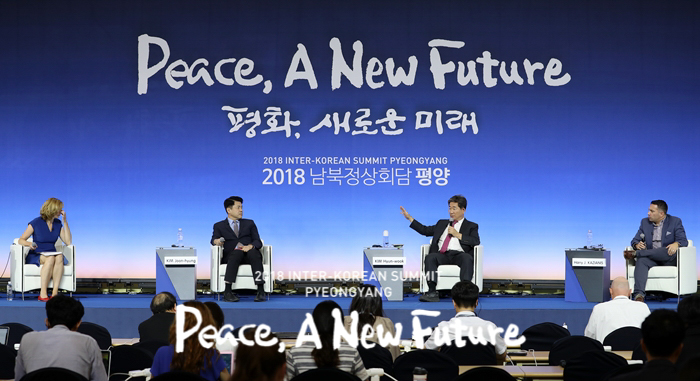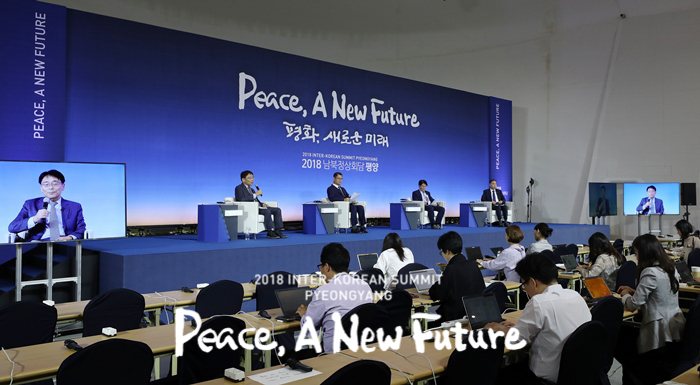-
 Korea.net's 24-hour YouTube channel
Korea.net's 24-hour YouTube channel- NEWS FOCUS
- ABOUT KOREA
- EVENTS
- RESOURCES
- GOVERNMENT
- ABOUT US

A panel discussion is underway under the theme of ‘A forecast for the 2018 Inter-Korean Summit: Process of implementing the Panmunjeom Declaration,’ in the main press center for the 2018 Inter-Korean Summit Pyeongyang at the Dongdaemun Design Plaza in Seoul on Sept. 17, just one day until the third inter-Korean summit begins. (Pyeongyang Press Corps)
By Pyeongyang Press Corps
On Sept. 17, just one day before the 2018 Inter-Korean Summit Pyeongyang, two panel discussions brought together experts on Korean Peninsula issues at the Dongdaemun Design Plaza in Seoul to share their insights into the upcoming Pyeongyang Summit.
The first discussion involved Korean experts, including Cho Seong-ryoul, a senior researcher at the Institute for National Security Strategy, and Professor Lee Jung-chul from Soongsil University. The theme for their talks was "the denuclearization of the Korean Peninsula and how to jump-start a virtuous circle to establish peace and co-prosperity in the region."
"If there is a vision for an improved North Korea-U.S. relationship, inter-Korean agreement on establishing peace on the Korean Peninsula, and the U.S.’s forward-looking attitude toward the end of war, then Pyeongyang will be able to respond with assertive denuclearization measures," said researcher Cho. “If the three parties -- South and North Korea, and the U.S. -- can create a virtuous cycle with simultaneous actions, we will be able to see action taken on denuclearization.”
“One of the critical roles that the South Korean government must play at the Pyeongyang Summit is to suggest a common ground between North Korea and the U.S.,” said Professor Lee.
The second panel discussion featured prominent non-Korean experts, and saw BBC Seoul correspondent Laura Bicker chair the discussion. Harry J. Kazianis, director of defense studies at the Center for the National Interest, and Professor Ruediger Frank from the University of Vienna focused on the subject of "A forecast for the 2018 Inter-Korean Summit: Process of implementing the Panmunjeom Declaration."
Frank had a positive view of the process of the North’s denuclearization that has been made since the first inter-Korean summit this year. Citing the recent resumption of the inter-Korean liaison office, the professor hoped to see more outcomes after the third summit, especially in terms of benefits to the peoples on both sides.
Meanwhile, Director Kazianis called for U.S. President Donald Trump to be more “flexible” to solve the stalemated Washington-Pyeongyang relationship. “When you think about denuclearization, I think we have to think about how long that’s going to take and all the different problems that could happen. If we’re going to go down to the path of denuclearization to have better relations, do not go back to the ‘fire and fury’ again,” he stressed.

Experts talk about denuclearization on the Korean Peninsula and how to jump-start a virtuous circle of peace and co-prosperity during a panel discussion on Sept. 17 at the main press center in Seoul. (Pyeongyang Press Corps)
Another panel discussion is slated to be held on Sept. 20 as the summit comes to an end, and participants will share their thoughts about the theme of “The outcome of the third Inter-Korean Summit, Pyeongyang, and the future relationships of the two Koreas and of the North and the U.S.”
Most popular
- First hearing-impaired K-pop act hopes for 'barrier-free world'
- 'Mad Max' director impressed by 'cinema-literate' Korean viewers
- Romanian presidential couple visits national cemetery
- 'Korean mythology is just as wonderful as Greek and Roman'
- Hit drama 'Beef' wins awards from 3 major Hollywood guilds













